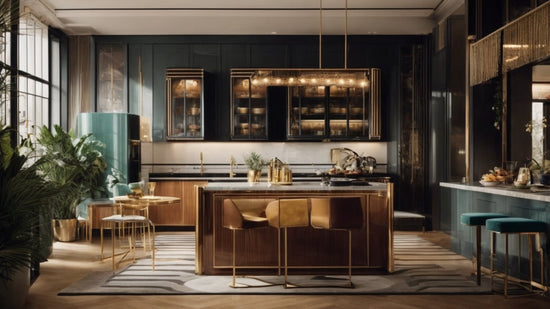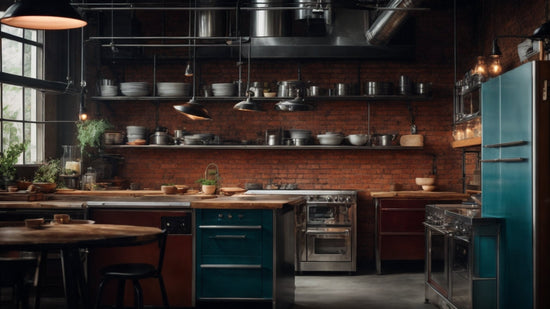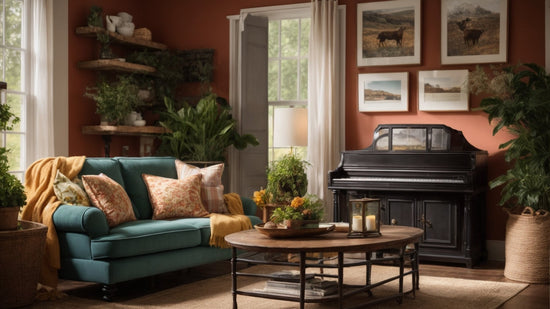Traditional Interior Design: Adding Timeless Elegance to Your Home
Table of content
1. Understanding Traditional Interior Design
What defines traditional interior design?
Traditional interior design is characterized by classic elegance, refined furnishings, and timeless appeal. It draws inspiration from European styles of the 18th and 19th centuries, incorporating luxurious materials, intricate details, and sophisticated color palettes.
- Rich fabrics like silk, velvet, and brocade
- Ornate furniture with carved wood details
- Antique or reproduction pieces
- Formal symmetry and balance
- Warm, inviting color schemes
2. Embracing Traditional Color Palettes
What are some common color palettes in traditional interior design?
Traditional interior design often features warm, muted colors that create a sense of coziness and elegance. Common color palettes include:
- Soft neutrals like beige, ivory, and taupe
- Rich jewel tones like burgundy, navy, and emerald
- Warm shades of gold, copper, and bronze
3. Incorporating Classic Furniture Styles
What types of furniture are typically found in traditional interiors?
Traditional interiors feature furniture with timeless appeal and refined craftsmanship. Common furniture styles include:
- Queen Anne
- Chippendale
- Victorian
- French Provincial
4. Creating Elegant Living Spaces
How can you create an elegant living room with traditional design?
To create an elegant living room with traditional design, consider the following elements:
- Plush seating arrangements with upholstered sofas and armchairs
- Accent tables with intricate detailing and curved legs
- Classic artwork and decorative accessories
- Formal window treatments like drapes or curtains with valances
- Layered lighting with chandeliers, sconces, and table lamps
5. Designing a Timeless Dining Room
What are some key features of a traditional dining room?
A traditional dining room should evoke a sense of warmth, comfort, and elegance. Key features include:
- A large dining table with ornate legs and carved details
- Upholstered dining chairs with high backs and decorative accents
- A statement chandelier or pendant light fixture
- Formal china cabinets or sideboards for storage and display
- Richly patterned area rugs and curtains
6. Creating a Cozy Bedroom Retreat
How can you design a traditional bedroom that feels cozy and inviting?
To design a cozy traditional bedroom, focus on soft textures, warm colors, and elegant details:
- A luxurious canopy or four-poster bed with flowing curtains
- Plush bedding with layers of pillows and throws
- Antique or reproduction bedside tables and dressers
- Soft, neutral wall colors or rich, deep hues
- Classic window treatments like curtains with valances or swags
7. Incorporating Traditional Architectural Details
What are some common architectural details found in traditional homes?
Traditional homes often feature architectural details that add to their charm and character:
- Crown molding and baseboards
- Wainscoting and paneling
- Detailed trim work around doors and windows
- Fireplace mantels with intricate carvings
- Coffered ceilings or ceiling medallions
8. Enhancing Traditional Spaces with Accessories
What types of accessories complement traditional interiors?
Accessories play a key role in adding personality and charm to traditional spaces:
- Classic artwork like oil paintings or framed prints
- Porcelain or ceramic vases and figurines
- Decorative throw pillows and blankets
- Antique or vintage clocks, lamps, and mirrors
- Tabletop accessories like candlesticks and trays
9. Incorporating Traditional Patterns and Textiles
What are some traditional patterns and textiles commonly used in home decor?
Traditional interiors often feature timeless patterns and textiles that add depth and visual interest:
- Toile
- Florals
- Stripes
- Plaids
- Damask
10. Balancing Old and New
How can you mix traditional and modern elements in home decor?
Combining traditional and modern elements can create a unique and balanced look:
- Pair antique furniture with contemporary artwork
- Mix vintage textiles with sleek, modern furnishings
- Combine classic architectural details with minimalist accents
- Integrate traditional color schemes with bold, modern accents
11. Understanding the Role of Symmetry
Why is symmetry important in traditional interior design?
Symmetry is a key principle of traditional interior design, creating a sense of balance and harmony:
- It helps create a sense of order and stability
- It adds visual interest and sophistication
- It reinforces the formal and elegant aesthetic of traditional design
12. Designing Timeless Kitchen Spaces
How can you design a traditional kitchen that stands the test of time?
Traditional kitchens blend classic elegance with modern convenience:
- Choose cabinetry with raised panel doors and decorative molding
- Opt for natural stone countertops like granite or marble
- Incorporate traditional elements like farmhouse sinks and bridge faucets
- Add warmth with wood flooring or ceramic tile in classic patterns
13. Creating Inviting Entryways
What are some elements of a welcoming traditional entryway?
A traditional entryway sets the tone for the rest of the home:
- Add a statement-making front door with decorative hardware
- Include a stylish entry table or hall tree for storage and display
- Hang a classic chandelier or pendant light fixture
- Layer in traditional rugs, artwork, and mirrors for added charm
14. Incorporating Formal Dining Spaces
How can you create a formal dining space with traditional design?
A formal dining room is the perfect place to showcase traditional style:
- Choose an elegant dining table with matching chairs
- Add a grand chandelier or candelabra-style lighting fixture
- Include a china cabinet or buffet for storage and display
- Dress windows with luxurious curtains or drapes
15. Designing Traditional Bathroom Retreats
What are some key features of a traditional bathroom design?
A traditional bathroom should feel luxurious and spa-like:
- Install a clawfoot tub or pedestal sink for vintage charm
- Incorporate classic fixtures like cross-handled faucets and brass hardware
- Choose marble or porcelain tile for timeless elegance
- Add warmth with soft lighting and plush towels
16. Enhancing Traditional Bedrooms
How can you create a cozy traditional bedroom retreat?
A traditional bedroom should be a peaceful sanctuary:
- Invest in a quality mattress and luxurious bedding
- Choose a classic sleigh bed or upholstered headboard
- Add layers of soft textiles like quilts, throws, and pillows
- Incorporate traditional furniture pieces like dressers and nightstands
17. Incorporating Elegant Lighting Fixtures
What types of lighting fixtures are suitable for traditional interiors?
Traditional interiors benefit from a variety of lighting sources:
- Install a grand chandelier or pendant light in the entryway or dining room
- Use wall sconces or picture lights to highlight artwork and architectural details
- Include table lamps and floor lamps for ambient and task lighting
What defines traditional interior design?
Traditional interior design is characterized by classic elegance, refined furnishings, and timeless appeal. It draws inspiration from European styles of the 18th and 19th centuries, incorporating luxurious materials, intricate details, and sophisticated color palettes.
What are some common color palettes in traditional interior design?
Traditional interior design often features warm, muted colors that create a sense of coziness and elegance. Common color palettes include:
- Soft neutrals like beige, ivory, and taupe
- Rich jewel tones like burgundy, navy, and emerald
- Warm shades of gold, copper, and bronze
What types of furniture are typically found in traditional interiors?
Traditional interiors feature furniture with timeless appeal and refined craftsmanship. Common furniture styles include:
- Queen Anne
- Chippendale
- Victorian
- French Provincial
How can you create an elegant living room with traditional design?
To create an elegant living room with traditional design, consider the following elements:
- Plush seating arrangements with upholstered sofas and armchairs
- Accent tables with intricate detailing and curved legs
- Classic artwork and decorative accessories
- Formal window treatments like drapes or curtains with valances
- Layered lighting with chandeliers, sconces, and table lamps
What are some key features of a traditional dining room?
A traditional dining room should evoke a sense of warmth, comfort, and elegance. Key features include:
- A large dining table with ornate legs and carved details
- Upholstered dining chairs with high backs and decorative accents
- A statement chandelier or pendant light fixture
- Formal china cabinets or sideboards for storage and display
- Richly patterned area rugs and curtains



